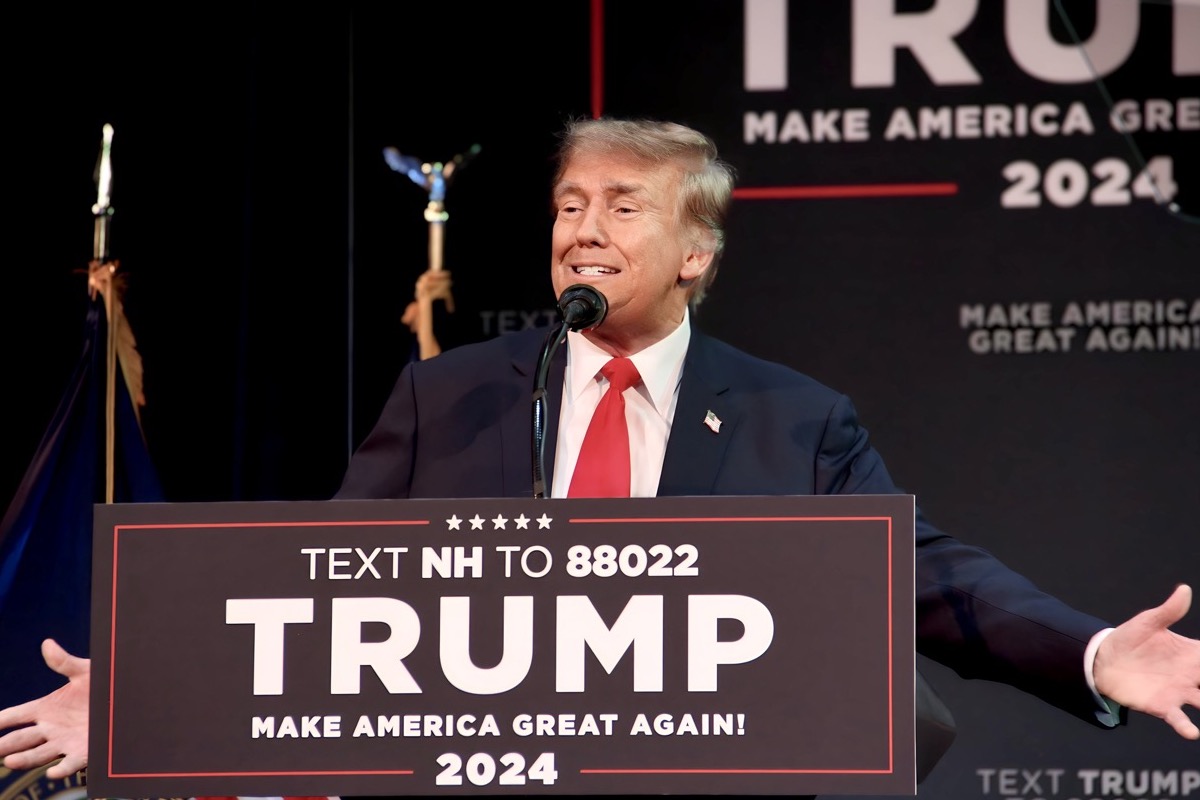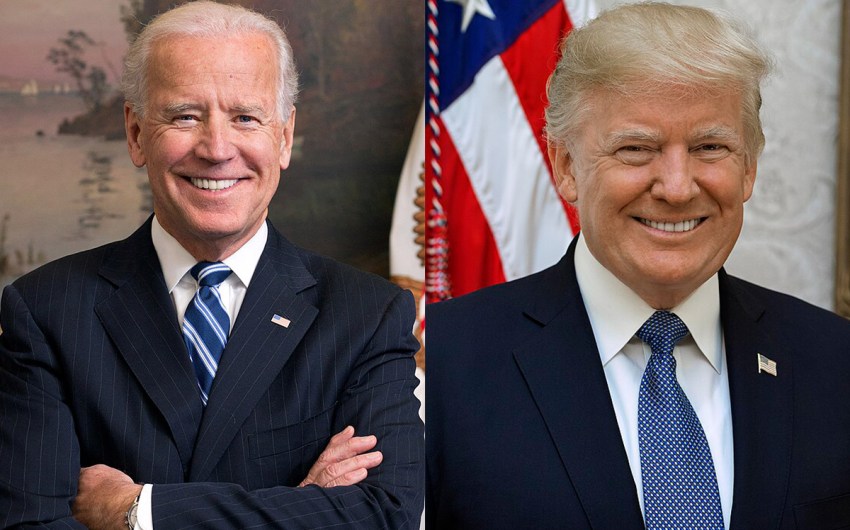Trump’s Authoritarian Promise
A Pro-Democracy Group Details Methods and Motives of Plans to Vastly Expand Executive Power

The presidential race that voters didn’t want, a match-up between the antediluvian Democrat and the Republican autocrat, has begun.
Last week, former President Donald Trump effectively clinched the Republican nomination for the third straight time, as incumbent Joe Biden delivered a campaign stemwinder as his third State of the Union address. This confluence of events delivered a harsh dose of reality to voters hooked on hopium, or still in denial, that the nation would not really have to face Biden–Trump: The Sequel.
Amid voter anxiety about Biden’s age of 81, or the 91 criminal charges against Trump — along with real-life concerns, from abortion rights, climate change, and sky-high grocery prices to crime, immigration, and sky-high grocery prices — the 2024 election also poses a more fundamental and urgent, if seemingly less practical, question:
What form of government will we have in 2025?
Joe Biden is a traditional politician whose policy ideas, while sometimes controversial, range between the 40-yard lines of mainstream American governance; Donald Trump, however, openly, routinely, and unapologetically challenges basic values of 18th-century liberal (small “d”) democracy on which the nation was founded: the rule of law, pluralism, and the separation of powers, for starters.
“The heart of Trump’s agenda is not to address particular policy challenges or advance public policy goals; it is to aggrandize the executive branch’s powers and use them for retribution,” the nonprofit organization United to Protect Democracy wrote in a recently released study of Trump’s stated promises and policy plans, titled “The Authoritarian Playbook for 2025.”
Amid Trump’s frequent, autocratic public statements — e.g., per the Constitution, “I have the right to do whatever I want as president” — allies in his MAGA (Make America Great Again) movement have populated and established Washington think tanks and legal circles that already have prepared detailed policy plans, assembled lists of potential administration employees pre-tested for loyalty, and set forth judicial arguments for use in a second Trump term; these rest on vastly expanding powers of the President, via a concept known as the “unitary executive.” Chief among these sets of proposals is Mandate for Leadership: The Conservative Promise, a 887-page doorstop produced by the Heritage Foundation’s “Project 2025 Presidential Transition Project,” as part of a “unified effort to be ready for the next conservative administration to govern at 12:00 noon, Jan. 20, 2025,” when the next president will be inaugurated.
For “The Authoritarian Playbook 2025,” the pro-democracy group assembled former government officials, scholars, lawyers, activists, and others of both major political parties to factually analyze these promises and plans, and to identify specific levers of power a Trump administration could wield to implement the vision of government espoused by him and his allies. They also assessed the strength of legal, political, and normative guardrails that might challenge his political project.
The report identified six areas of concern:
- Pardons to license lawbreaking
- Investigations against critics and rivals
- Regulatory retaliation
- Federal law enforcement overreach
- Domestic deployment of the military
- Refusal to leave office
Trump has made no secret of his admiration for autocrats and dictators around the world, from Russia’s Vladimir Putin and China’s Xi Jinping to North Korea’s Kim Jong Un and Hungary’s Viktor Orbán. In his first term, he repeatedly sought to exert their brand of singular executive power, from the judicially rejected “Muslim ban” in his first days in office in 2017 to the insurrectionist mob he rallied to stop congressional certification of the 2020 election.
To a second term, Trump would bring far more knowledge of how the federal government works. It is unlikely he would appoint to his staff or Cabinet the kind of institutional “grownups” who frustrated some of his more antidemocratic initiatives, in favor of MAGA loyalists who would pledge to do his bidding.
As Kash Patel, a first-term Trump national security official, phrased it in a discussion on the War Room podcast of Steve Bannon, former Trump White House chief strategist:
“The one thing we learned in the Trump Administration, the first go-around, is we got to put in all America patriots, top to bottom, and we got them for law enforcement, we got them for intel collection, we got them for offensive operations, we got them for (Defense Department), CIA, everywhere…
“Yes, we’re going to come after the people in the media who lied about American citizens, who helped Joe Biden rig elections — we’re going to come after you. Whether it’s criminally or civilly, we’ll figure that out.”
Thirty-three Tuesdays before the November 5 election, media polls show that Trump leads Biden, both in the national popular vote and in most of the handful of key states that will determine the Electoral College outcome.
Here are four instructive takeaways from “The Authoritarian Playbook for 2025.”
Henchmen pardons. The president’s constitutional power to extend clemency to those convicted of breaking the law, by issuing pardons and prison sentence commutations, is nearly absolute.
The power may be abused by letting off political allies for conduct that benefits the president — as Trump did with Roger Stone and Paul Manafort after they refused to cooperate with Special Prosecutor Robert Mueller’s Investigation of Russian interference in the 2016 election. It can also be abused to enable or excuse violence by supporters — as Trump has vowed to do for many of more than 1,200 convicted January 6 rioters.
In the same way, a president can promise clemency in advance for breaking a law that benefits the chief executive — as he told his Customs and Border Protection Commissioner he would do if he was charged for implementing a legally questionable Trump policy. He can also do so to protect himself from legal consequences — as Trump has vowed to do in criminal cases against him, if elected a second time.
There are few government guardrails against such clemency actions, sometimes termed “henchmen pardons.”
The buffers are primarily norms of ethical behavior, not legal requirements. Trump in his first term overrode or ignored most of these guardrails — such as political or congressional pressure, advice from White House lawyers, and his oath to “faithfully execute” the law — and could be expected to be more aggressive in doing so in a second term.
The most formal process to prevent abuse of the pardon power rests with the Office of Pardon Attorney, an officer within the Department of Justice who oversees applications and guidelines.
The “Authoritarian Handbook” study reported that of the 238 clemency orders Trump granted during four years in office, only 25 — 11 percent — were recommended by the Office of Pardon Attorney.
Politically motivated investigations. In his first term, Trump famously asked, “Where’s my Roy Cohn?” when Jeff Sessions, his first Attorney General, enraged him by recusing himself from the investigation into Russian election interference instead of shutting it down.
Invoking the late Cohn, who in New York represented the mob and Trump as a New York developer, among other clients, speaks volumes about Trump’s view of the Department of Justice.
In a second term, Trump publicly has vowed to prosecute and jail political enemies and individuals who have criticized him, from Joe Biden to his own former White House Chief of Staff, second Attorney General, and Joint Chiefs of Staff chair.
Doing so would end the traditional independence and impartiality of the Justice Department, and MAGA attorneys already have prepared justifications for doing so.
Presidential administrations of both parties for decades have generated documents known as “contact memos” to establish policies and procedures limiting communications between the White House and the Justice Department to a small number of senior officials, to ensure the propriety of such dealings.
The Heritage Foundation, as part of its “Project 2025,” has proposed a second Trump Administration “reexamine” — i.e., end — the use of “contact memos.”
MAGA attorneys meanwhile publicly make the case against Justice Department independence.
One of the more prominent is Jeffrey Clark, whom Trump sought to appoint Acting Attorney General in the final days of his term, because Clark promised to take official action in furtherance of the president’s false claims about widespread 2020 voter fraud. The appointment was stopped only by the threat of mass resignations by career DOJ attorneys.
Clark — who, along with Trump, has been indicted for his actions — now is viewed in Washington as a possible second-term Attorney General. He has been high-profile in calling for elimination of restraints on a president personally directing prosecutions or investigations.
“The U.S. Justice Department is not independent,” read the headline of a widely discussed article he wrote for Center for Renewing America, a MAGA-allied think tank, in which he termed the norm a “canard” and the use of contact memos unnecessary “rigamarole.”
“We shouldn’t doubt that (Trump) will follow through on his pledge to appoint DOJ and White House lawyers who will have no qualms about, and thus will not inhibit from, carrying out his vision of personal absolute control over the government’s law enforcement powers,” the democracy group report said.
“And at the same time, he’ll shut down any inquiry into wrongdoing by him or his allies. This is a recipe for rampant authoritarianism directed from the Oval Office.”
Ending civil service. A president controls about 4,000 political appointments in a federal government workforce of about 2.9 million employees.
Trump has vowed to change that in a second term, with an attack on the civil service system, which was created to end patronage and the “spoils system” of filling government jobs with political loyalists, beginning with the Pendleton Act of 1883.
In multiple public statements, he has promised to “totally obliterate the deep state,” by issuing an executive order, titled “Creating a Schedule F in the Excepted Service,” to circumvent certain regulations and clear the way to fire tens — perhaps hundreds — of thousands of merit-based professional employees and replace them with Trump loyalists.
Allies and advisers already are screening candidates “more on political philosophy than on experience, education, or other credentials,” the report notes.
Domestic deployment of the military. Since the Declaration of Independence, there has been deep opposition to deploying the military on U.S. soil. Trump, however, already has suggested he would do so in a second term, using loopholes in constraints on his authority as Commander in Chief, which include the congressional War Powers Resolution of 1973, and the Posse Comitatus Act of 1878, proscribing the military from engaging in domestic law enforcement.
The most consequential of these is the Insurrection Act, which allows the president to order military members to take part in domestic law enforcement under certain, very limited conditions, and which Trump avidly sought to do during the George Floyd protests.
“Using the military was one of the President’s fixations that had to be batted down on a regular basis,” former Attorney General Bill Barr wrote in his memoir. “For a time, almost on a weekly basis, he would give me ultimatums — he said he was ready to invoke the Insurrection Act and deploy the military (to American cities) in twenty-four hours unless I came forward with an alternative plan.”
Barr enabled many of Trump’s worst impulses in the first term but was successful in blocking his use of the Insurrection Act; it is unlikely a second term Attorney General would do the same.
“Politicizing institutions like the military,” the democracy study concludes, “is a hallmark authoritarian tactic intended to silence dissenters, target vulnerable communities and coerce fealty to the autocratic leader.”
Jerry Roberts is the host of the weekly local news program Newsmakers with JR.
Premier Events
Sun, Apr 28
6:00 PM
Santa Barbara
AHA! Presents: Sing It Out!
Thu, May 02
5:00 PM
Santa Barbara
Things with Wings at Art & Soul
Sat, May 04
10:00 AM
Lompoc
RocketTown Comic Con 2024
Sat, Apr 27
11:00 AM
Santa Barbara
Santa Barbara Plant Fest
Sat, Apr 27
3:30 PM
Santa Barbara
Santa Barbara Trapeze Co and Unity Shoppe Spring Food Drive
Sat, Apr 27
8:00 PM
Santa Barbara
Beau James Wilding Band Live
Sun, Apr 28
11:00 AM
Santa Barbara
Santa Barbara Earth Day Festival 2024
Wed, May 01
7:30 PM
Santa Barbara
American Theatre Guild Presents “Come From Away”
Thu, May 02
5:00 PM
Santa Barbara
100th Birthday Tribute for James Galanos
Thu, May 02
5:00 PM
Santa Barbara
Meet the Creator of The Caregiver Oracle Deck
Fri, May 03
4:00 PM
Santa Barbara
Santa Barbara Fair+Expo “Double Thrill Double Fun”
Fri, May 03
8:00 PM
Santa barbara
Performance by Marca MP
Sat, May 04
10:00 AM
Solvang
Touch A Truck
Sun, Apr 28 6:00 PM
Santa Barbara
AHA! Presents: Sing It Out!
Thu, May 02 5:00 PM
Santa Barbara
Things with Wings at Art & Soul
Sat, May 04 10:00 AM
Lompoc
RocketTown Comic Con 2024
Sat, Apr 27 11:00 AM
Santa Barbara
Santa Barbara Plant Fest
Sat, Apr 27 3:30 PM
Santa Barbara
Santa Barbara Trapeze Co and Unity Shoppe Spring Food Drive
Sat, Apr 27 8:00 PM
Santa Barbara
Beau James Wilding Band Live
Sun, Apr 28 11:00 AM
Santa Barbara
Santa Barbara Earth Day Festival 2024
Wed, May 01 7:30 PM
Santa Barbara
American Theatre Guild Presents “Come From Away”
Thu, May 02 5:00 PM
Santa Barbara
100th Birthday Tribute for James Galanos
Thu, May 02 5:00 PM
Santa Barbara
Meet the Creator of The Caregiver Oracle Deck
Fri, May 03 4:00 PM
Santa Barbara
Santa Barbara Fair+Expo “Double Thrill Double Fun”
Fri, May 03 8:00 PM
Santa barbara
Performance by Marca MP
Sat, May 04 10:00 AM
Solvang






















